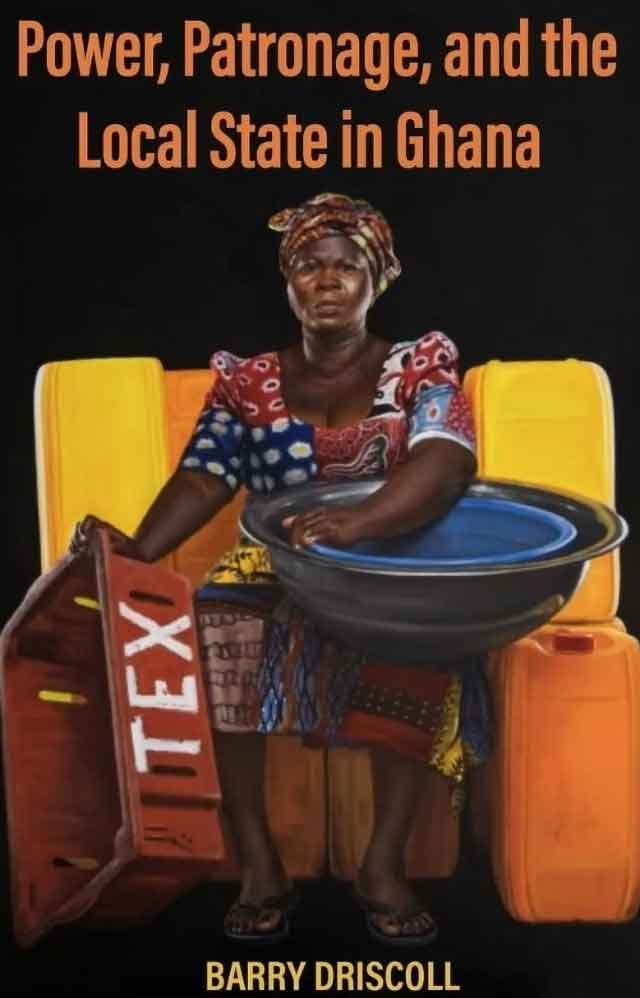Power, Patronage, and the Local State in Ghana, by Barry Driscoll, published by Ohio University Press, Athens, Ohio (2023)

In Power, Patronage, and the Local State in Ghana, Barry Driscoll examines the unwritten rules and inner workings of clientelism (patronage and vote buying) in Ghana’s politically competitive environment and its impact on the local state apparatus.
Driscoll puts forth that Ghana is a useful case study on competitive politics, mostly between the two main political parties, the National Democratic Congress (NDC) and the New Patriotic Party (NPP), for two main reasons.
Firstly, Ghana’s history is representative of many developing countries in recent decades, having attained independence earlier than most in 1957 and going through several periods of structural adjustment and transition from authoritarianism. Despite the decentralisation of the state, the central government still retains important sources of control over the government’s finances and personnel. Secondly, there is a troubling disconnect between Ghana’s international image and the way Ghanaians view their country. Although Ghana remains one of Africa’s star performers for its political stability and is viewed by outsiders as a model for its neighbours, its citizens from various towns and villages view their country as a model of corruption, rentierism, and inequity.
To make sense of the complex relationship between power and patronage, Driscoll struck a balance between quantitative and qualitative research. Qualitative data was largely sourced from district chief executives, politicians, party activists, market traders, tax collectors, and other personnel in local state offices, and quantitative data was sourced from surveys covering almost all local governments.
His extensive study, conducted across six districts, primarily revealed that one of the greatest sources of pressure on local state actors, such as politicians and chief district officers, is not violent gangs, rent-seeking bureaucrats, landed elites, or boisterous opposition parties but rather the demands for favours coming from their own party supporters, and in turn how political party systems mediate the relationship between local state actors and the groups that keep them in power.
Equally, the author’s findings showed that individual vote-buying is not as common in Ghana. In the cross-national surveys mentioned in the book, Ghanaians reported some of the lowest individual vote buying across 29 sub-Saharan African countries. Driscoll argues that the state’s strong party system leads to low voter mobility between parties, so clientelistic parties only need to buy voter turnout rather than the vote itself.
The comparative analysis of the aforementioned groups of local state actors revealed a complex interplay of relationships. For instance, district chief executives (commonly referred to as chief executives) are uneasily situated between demanding forces from above and below. Driscoll puts forth that, from “above”, they are “the president’s men”, expected to dutifully carry out the mandate of the president and his party since the president has the power to appoint and fire chief executives at will.
But from “below”, in the eyes of the activists of the governing party, a chief executive is “our man”. This is because, according to party activists, the chief executive occupies their office. After all, activists got them there. This they accomplish by toiling to get their party into power in national elections as well as forwarding the name of the chief executive for the president to nominate in the first place. Yet again, for some district chief executives, the ability to ultimately control and manipulate party activists once in power is done through listening to them and being receptive to their demands. This means, for example, that it is not uncommon for certain NDC-controlled districts to provide more patronage than other NDC-controlled districts.
Even though Driscoll’s research shows that party activists use their power to demand patronage from district chief executives, they are not always successful. Some featured cases show that chief executives can ignore or disregard party activists’ demands and opt instead to negotiate with opposition assembly members to get the central government’s plans underway. This is because in Ghana, although the ruling party holds executive control of the state, elections are sufficiently fair and usually closely fought to warrant and sustain the opposition’s engagement, even if it is otherwise excluded from state rents.
The explanation developed throughout the book is that such scenarios mean that political competition shapes how exposed or vulnerable a politician is to their own supporters. In certain districts, the chief executives were found to be relatively insulated from demands for patronage from their own party activists because party electoral strength was not precariously balanced. This simply means that being a member of the ruling party, even as a party activist, is insufficient to ensure patronage.
Driscoll clarifies why there is a difference across states in response to patronage demands made by party members and activists. The difference results from the variation in paths to power and consequently insulation/exposure while in office and their connection to the party apparatus, notwithstanding political competition during elections. This ultimately generates two types of candidates for local state office: chief district executives beholden to activists or those labelled as insufficiently partisan.
The chief executives beholden to activists are often inundated with requests that range from securing employment (be it blue-collar or white-collar jobs in government), preferential treatment when processing loans or documents such as birth certificates, or simply priority access to resources such as state-provided fertiliser. Suffice it to say, when campaigning for office, district chief executives do make such promises, which activists expect to be fulfilled. Featured in the book are cases of disgruntled party supporters, particularly youth, who were promised jobs and loans that they never received. Consequently, in some districts, this resulted in protests, that nonetheless had no impact.
Fascinatingly, Driscoll also shows that partisans with a strong desire to provide patronage may not necessarily undermine state capability by emphasising the role that patronage networks play in political rivalry and decision-making. This is because politicians may feel pressured to create more robust bureaucracies to fulfil their patronage-giving obligations.
Therefore, local governments often hire highly qualified civil servants to improve administration in politically competitive and patronage-giving situations. Evidently, what often constrains government workers and civil servants more is the lack of resources to perform their duties.
Overall, Driscoll’s attempt to demonstrate, in great detail, the complexities of Ghana’s local state and political environment in the quest to understand the dynamics of political struggle in developing nations enumerates the following broad lessons for the field of comparative study:
Firstly, observers of developing countries often fail to distinguish between the two aspects of clientelism: patronage and vote-buying. Driscoll puts forth that many examples of clientelism featured in his book would fit a general definition of corruption. Consequently, corruption can be disguised as clientelism.
Furthermore, varieties of clientelism are key to influencing the strength of party systems, meaning political systems can exhibit different forms of patronage, such that a country with very little vote buying like Ghana could still be highly clientelistic, which influences corruption levels.
Thirdly, bureaucrats are less constrained by their own incompetence or lack of resources but more by the general political environment in which they operate. The deeper challenge for some weak states may not be in hiring better bureaucrats but in negotiating mutually beneficial partnerships between state and non-state actors. This is because the government in Ghana relies heavily on its non-state actors, such as the private sector and non-governmental organisations, for information and funding.
Across the board, the evolving landscape of developing nations shows how decentralisation is not a “magical solution”. Regrettably, clientelism, when left unchecked, is arguably the reason why decentralisation has often led to forms of corruption such as rent-seeking.

Sarah Nyengerai is an academic and freelance writer based in Zimbabwe with a strong passion for social, cultural, economic and political issues that affect women. She believes literary works form the foundation for the dialogue required to sustain momentums of change and aims to bring attention to such matters. A member of NAFSA (Association for International Educators) and Forum for African Women Educationalists (FAWE), Sarah is actively involved in the advancement of education for women.


